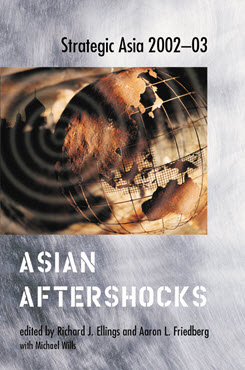Southeast Asia (Strategic Asia 2002-03)
This chapter assesses Southeast Asia in the wake of September 11 and the reactions of the region’s core states to U.S. efforts to create effective regional anti-terrorist cooperation. The focus is on those Southeast Asian states where terrorist cells operate and where there is at least some evidence that these cells aid one another across national boundaries—Indonesia, Malaysia, the Philippines, and Thailand.
Southeast Asia’s political and economic variety covers the gamut from powerful and effective governments (Singapore) to the early stages of state-building, national identity, and cohesiveness (East Timor, Laos, and Cambodia) and points in between where political pluralism is still fragile (the Philippines, Thailand, and Indonesia). Although 10 of Southeast Asia’s 11 members form the Association of Southeast Asian Nations (ASEAN), this organization has been of limited utility in recent regional crises such as the 1997–98 Asian financial crisis, the 1999 secession of East Timor from Indonesia, and the current U.S. war on terrorism in the wake of the September 11 attacks on the United States.
This chapter assesses Southeast Asia in the wake of September 11 and the reactions of the region’s core states to U.S. efforts to create effective regional anti-terrorist cooperation. The focus is on those Southeast Asian states where terrorist cells operate and where there is at least some evidence that these cells aid one another across national boundaries—Indonesia, Malaysia, the Philippines, and Thailand. Radicals in Southeast Asia constitute a relatively small minority of the Muslim community throughout the region, though Islamist cells have been discovered in Indonesia, Malaysia, Singapore, and the Philippines. While there is some evidence of transnational cooperation among the radicals, for the most part their activities are confined to the countries in which they are located. None seriously threatens any government’s viability. However, without continued economic growth and a more equitable distribution of national wealth, particularly in Indonesia and the southern Philippines, as well as reduced corruption and coercion, particularly by political elites in Malaysia, Indonesia, and the Philippines, the conditions which nurture militants will persist.
These conditions, of course, vary among the core states in Southeast Asia. Malaysia’s Prime Minister Mahathir Mohamad has used the war on terrorism to strengthen his party’s position by painting the Muslim opposition as supportive of terror. Indonesian officials have eschewed confrontation with radicals, fearing an electoral backlash in the world’s largest Muslim democracy. The Philippines, recently with direct U.S. military and financial assistance, has cracked down on the most extreme terrorists in the south, the Abu Sayyaf, while negotiating power-sharing arrangements with two much larger Muslim political movements. In Thailand, persistent low-levelviolence in the south does not appear to be linked to the region’s Islamists.
U.S. anti-terrorist actions are focused on the southern Philippines, where U.S. Special Forces are advising the Philippine military, although not actually participating in the hunt for terrorists. In the rest of the region, Washington offers assistance to upgrade law enforcement capability, intelligence sharing, and ways to interdict and freeze terrorist finances. While the Bush administration hopes to reestablish military ties with Indonesia as a key component of Washington’s anti-terrorist, Southeast Asian coalition, U.S. congressional strictures preclude this until those Indonesian military officers responsible for atrocities in East Timor are brought to justice.
Exchange of intelligence with the United States on terrorist activities has been formally established with Malaysia, Singapore, and Thailand following FBI Director Robert Mueller’s visit to Southeast Asia in March 2002. Southeast Asian states on their own have begun to work together. Statements condemning terrorism and urging intelligence sharing and collaboration among law enforcement authorities have been issued by ASEAN and the ASEAN Regional Forum (ARF). However, the most effective anti-terrorist cooperation has been bilateral, particularly between Singapore and Malaysia. The latest development, though, is a counter-terrorism agreement among Malaysia, the Philippines, Indonesia, and Thailand to monitor their porous borders, across which illegal migration is ubiquitous. The efficacy of all these new joint efforts is problematic, however, given the limited surveillance and interdiction capabilities of Southeast Asian states. In sum, Southeast Asian states recognize the importance of collaborating to fight transnational terrorism, but their capabilities to do so are limited, and the political challenge of Islamists varies greatly from state to state. U.S. offers of assistance are generally welcome, though no Southeast Asian government wishes to be seen as pandering to U.S. demands, especially since many Southeast Asian Muslims insist that the U.S. war on terrorism is really an attack on Islam. Emphasizing the distinction between Islamist terrorists and the vast majority of peaceful Muslims is essential for both the United States and its Southeast Asian partners.
Strategic Asia
The Strategic Asia annual edited volume incorporates assessments of economic, political, and military trends and focuses on the strategies that drive policy in the region. Learn more about Strategic Asia.


